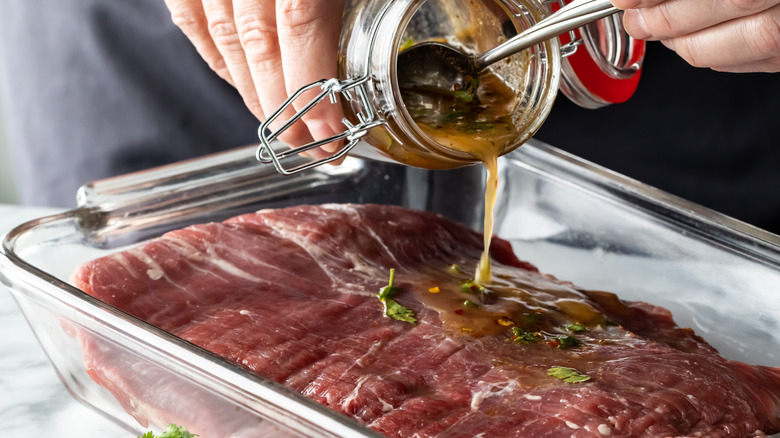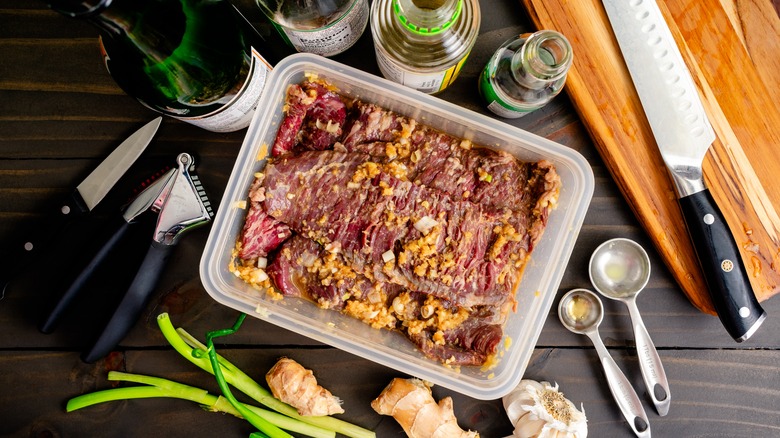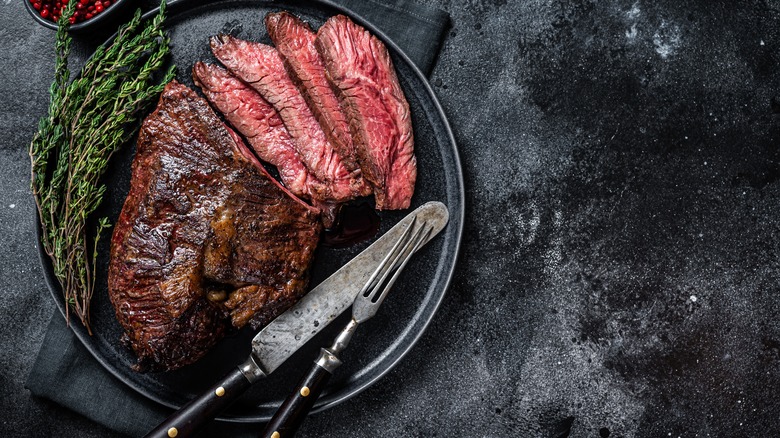Exactly How Long Should You Marinate Your Steaks?
It's always a big decision, whether or not to marinate your steaks. Fortunately, we can help make that decision a little easier with a quick — and easy-to-remember — explanation on what you should and shouldn't be marinating, what you're trying to do, and how long you should be marinating for.
First, let's talk about exactly what marinating does, because that's important in figuring out how long the process should take. Steak marinades add flavor, which is why Dr. Pepper and some of the most unusual meat marinades are so much fun to experiment with. But they're also used to change the texture of the meat, which can be the key to taking a tough cut of meat and turning it into a deliciously tender steak. That's a good thing, but it's entirely possible to get too much of a good thing.
Leave it too long, and you're likely to get a mushy steak instead of a tender one. Gross, right? Although there are a number of variables that impact exact times — like the type and cut of meat, and what's going into your marinade — the general rule is that four, eight, and 12 hours are some good times to aim for, but you shouldn't let meat sit in a marinade for more than 24 to 48 hours. What happens then? And what happens if time gets away from you, and you're not going to be able to cook your steaks in that time frame you'd planned for?
Here's some guidelines on how long you should marinate steaks for
Let's start out by saying that this is complicated, and there's no single answer that works for all cuts of steaks and all marinades. There are, in fact, a number of mistakes that people commonly make with marinades, and that includes letting your meat sit for too long or not long enough.
Fortunately, there are some general guidelines we can talk about, starting with the possibility that you're only looking at adding flavor with your marinade. In that case, 15 minutes can be enough to flavor some tender steaks, and two hours is about your max.
But let's say you have something like a flank steak. In that case, you're going to want the marinade to tenderize the meat as well, which means your sweet spot is between four to eight hours. That gives the marinade time to work some serious magic, without even coming close to the time frame that's going to take your meat from tender to mushy. That said, it's also worth noting that taste is subjective, and you might prefer your marinade to impart a stronger flavor, and work a little more to tenderize. Some might find that 12 hours is the sweet spot, and there's a benefit to this, too. Let's say you're planning on making some steak and avocado breakfast burritos: It's easy to plan on prepping steaks the night before, letting them sit overnight, and in the morning, they're going to be pretty perfect.
Over-marinating a steak will ruin your meat
There are a lot of variables and a lot of different guidelines that you'll find when it comes to just how long you should marinade steak for, but a good guideline is to consider 24 hours the maximum for ending up with a tasty piece of beef that you'll still want to eat. By 48 hours, you're going to have a mushy mess, no matter how resilient the cut of steak you're using is.
That mushy texture is the result of too much time spent exposed to the acidic elements of a marinade, and here's the thing: Those acidic elements are what helps make meat tender, which can be invaluable for certain, tougher cuts of beef. Those are pieces like flank steak, inside and outside skirt steaks, hanger steak, chuck, and round steaks. A marinade turns these lean and affordable cuts into something delicious, but you can definitely go too far. If you end up losing track of time, there's good news: You can definitely freeze your meat in the marinade to stop the process and save it for later.
It's also worth noting that for some steaks, putting them in any marinade is marinating them for too long. Some steaks — like filet mignon, ribeye, and tenderloin — definitely shouldn't be marinated. Since the point of the marinade is to make them tender and flavorful, there's no need to subject these delightfully delicious, more expensive cuts of steak to the process.


